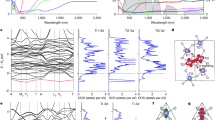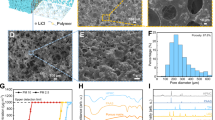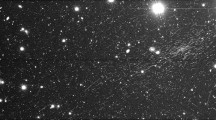Abstract
Carlson and Oppenheimer1 and Bhabha and Heitler2 have proposed a very ingenious explanation of showers by a multiplicative production of photons, electrons and positrons. The greater part of the showers observed can in this way be regarded as originated by electrons, positrons or photons penetrating from the atmosphere. Such showers are absorbed if the layer of lead is sufficiently thick. It is known, however, that at sea-level and especially under earth, the frequency of showers with increasing thickness of lead layer does not diminish but tends to a limit. We wish to point out that this phenomenon does not require a new concept of showers, but can be explained by irradiation with heavy particles, which easily penetrate through such layers of lead.
This is a preview of subscription content, access via your institution
Access options
Subscribe to this journal
Receive 51 print issues and online access
$199.00 per year
only $3.90 per issue
Buy this article
- Purchase on SpringerLink
- Instant access to the full article PDF.
USD 39.95
Prices may be subject to local taxes which are calculated during checkout
Similar content being viewed by others
References
Phys. Rev., 51, 220 (1937).
Proc. Roy. Soc., A, 159, 432 (1937).
Phys. Z. Sovjetunion, in the Press.
Phys. Rev., 51, 887 (1937).
Author information
Authors and Affiliations
Rights and permissions
About this article
Cite this article
LANDAU, L., RUMER, G. Production of Showers by Heavy Particles. Nature 140, 682 (1937). https://doi.org/10.1038/140682b0
Issue date:
DOI: https://doi.org/10.1038/140682b0



